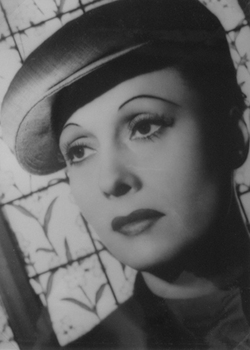Queer Places:
Nouveau Cimetière de Courbevoie
Courbevoie, Departement des Hauts-de-Seine, Île-de-France, France
 Léonie Marie Julie Bathiat (15 May 1898 – 23 July 1992[1]),
known professionally as Arletty, was a French actress, singer, and fashion
model. She was found guilty of treason for an affair with a German officer
during World War II,
but she continued her career which included playing Blanche in the French
version of A
Streetcar Named Desire. In the 1920s Chez Fysher attracted more and more
lesbians. The star until 1927 was Gaby Montbreuse, a busty redheaded singer
whose biggest success was You possessed me by surprise. Fisher's stars that
followed were: Yvonne George,
Damia, Marie Dubas,
Arletty, Lucienne Boyer,
Lys Gauty,
Gaby Basset.
Léonie Marie Julie Bathiat (15 May 1898 – 23 July 1992[1]),
known professionally as Arletty, was a French actress, singer, and fashion
model. She was found guilty of treason for an affair with a German officer
during World War II,
but she continued her career which included playing Blanche in the French
version of A
Streetcar Named Desire. In the 1920s Chez Fysher attracted more and more
lesbians. The star until 1927 was Gaby Montbreuse, a busty redheaded singer
whose biggest success was You possessed me by surprise. Fisher's stars that
followed were: Yvonne George,
Damia, Marie Dubas,
Arletty, Lucienne Boyer,
Lys Gauty,
Gaby Basset.
Arletty was born in Courbevoie (near
Paris), to a working-class family. After her father's death, she left home and
pursued a modeling career. She took the stage name "Arletty" based on the
heroine of a story by Guy
de Maupassant. She was not interested in acting until she met Paul
Guillaume, an art dealer. He recommended some theaters and, at the age of
21, she was hired.[2]
Her early career was dominated by the music
hall, and she later appeared in plays and cabaret. Arletty was a stage
performer for ten years before her film debut
in 1930. Arletty's career took off around 1936 when she appeared as the
leading lady in the stage plays Les
Joies du Capitole and Fric-Frac,
in which she starred opposite Michel
Simon. She later starred as Blanche in
the French version of A
Streetcar Named Desire.[3] Marcel Carné was
known for his poetic
realism filmmaking style. Arletty's minor role of Raymonde in his
film, Hotel du Nord, garnered attention for her "Atmosphere! Atmosphere!”
performance. In 1945 Arletty appeared in her most famous film role, the
central part of Garance in Les
Enfants du Paradis, her fourth role for the director. For this role she
earned one of the highest salaries ever in French cinema.[4]
Arletty was imprisoned in 1945 for her wartime liaison with a German
Luftwaffe officer, Hans-Jürgen Soehring,[5] during
the occupation
of France. She allegedly later commented on the experience, "My heart is
French but my ass is international."[6] The
quotation in French is, "Si mon cœur est français, mon cul, lui, est
international" and the word "cul" is also translated "sex." The French version
of Wikipedia says the phrase was suggested by Henri Jeanson, but is perhaps
apocryphal. Although other French women fell in love with German soldiers, her
romantic affiliation with Soehring during the German occupation prompted a
charge of treason.
James Lord wrote
of her special treatment: Arletty was too well known for the mere humiliation
of having her head shaved, her naked skull tarred with a swastika and in this
abject state paraded through the streets to confront the jeers and spittle of
the mob. Prison would be none too good for her, people said, looking forward
to severe retribution for the moral treason of which they found her guilty.[2]
For her crimes she received a sentence of eighteen months imprisonment, most
of which was served in a private chateau.
After a moderately successful period as a stage actress in later life she
was forced to retire into private life due to progressive loss of her eye
sight. One of her final screen appearances was in a small role as an elderly
French woman in The
Longest Day (1962). After her death in 1992, Arletty was cremated, and her
ashes interred in her hometown at the Nouveau Cimetière de Courbevoie.[7]
In 1995 the government of France issued a series of limited edition coins
to commemorate the centenary of film that included a 100 Franc coin bearing
the image of Arletty.[8]
My published books:


BACK TO HOME PAGE

 Léonie Marie Julie Bathiat (15 May 1898 – 23 July 1992[1]),
known professionally as Arletty, was a French actress, singer, and fashion
model. She was found guilty of treason for an affair with a German officer
during World War II,
but she continued her career which included playing Blanche in the French
version of A
Streetcar Named Desire. In the 1920s Chez Fysher attracted more and more
lesbians. The star until 1927 was Gaby Montbreuse, a busty redheaded singer
whose biggest success was You possessed me by surprise. Fisher's stars that
followed were: Yvonne George,
Damia, Marie Dubas,
Arletty, Lucienne Boyer,
Lys Gauty,
Gaby Basset.
Léonie Marie Julie Bathiat (15 May 1898 – 23 July 1992[1]),
known professionally as Arletty, was a French actress, singer, and fashion
model. She was found guilty of treason for an affair with a German officer
during World War II,
but she continued her career which included playing Blanche in the French
version of A
Streetcar Named Desire. In the 1920s Chez Fysher attracted more and more
lesbians. The star until 1927 was Gaby Montbreuse, a busty redheaded singer
whose biggest success was You possessed me by surprise. Fisher's stars that
followed were: Yvonne George,
Damia, Marie Dubas,
Arletty, Lucienne Boyer,
Lys Gauty,
Gaby Basset.
